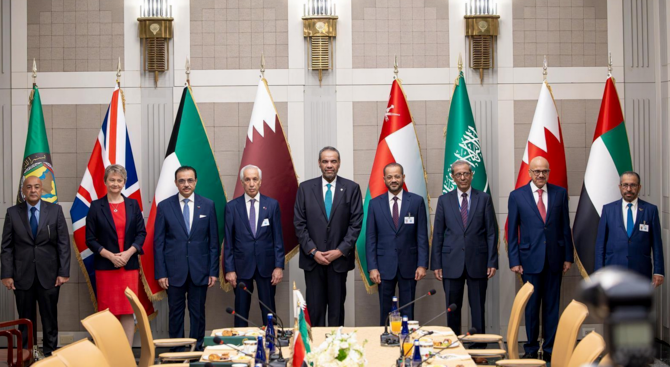September 25, 2025
GCC and UK ministers jointly condemned the humanitarian crisis in Gaza, calling for urgent international action to protect civilians and restore stability.

In a strong display of unity, ministers from the Gulf Cooperation Council (GCC) and the United Kingdom have condemned what they described as a humanitarian catastrophe unfolding in Gaza. The joint statement, issued after a high-level diplomatic meeting, highlights mounting international concern over civilian suffering amid the ongoing conflict in the besieged Palestinian territory.
The ministers stressed that the humanitarian situation in Gaza has deteriorated to alarming levels, with thousands of civilians caught in the crossfire of violence, displacement, and limited access to essential services. Food shortages, medical supply crises, and widespread destruction of infrastructure have pushed the enclave into what many international observers are calling one of the gravest humanitarian emergencies in recent decades.
UK officials, alongside GCC representatives from Saudi Arabia, the United Arab Emirates, Qatar, Bahrain, Kuwait, and Oman, underscored the urgent need for coordinated international action. They called for immediate efforts to ensure humanitarian corridors remain open, enabling aid agencies to deliver food, medicine, and emergency relief supplies to Gaza’s most vulnerable populations.
The meeting also emphasized the importance of upholding international law, particularly the protection of civilians during conflict. Both the UK and GCC ministers urged all parties to adhere to humanitarian principles and avoid actions that further exacerbate the crisis.
Diplomats familiar with the discussions revealed that the UK government is increasing its diplomatic outreach, engaging with international partners at the United Nations and European Union to mobilize resources and pressure for de-escalation. GCC states, already major contributors to humanitarian assistance in Palestine, reiterated their commitment to providing both financial and logistical aid.
Observers note that the joint condemnation reflects a growing recognition that instability in Gaza not only threatens regional security but also undermines broader international peace efforts. For the GCC, the crisis underscores longstanding concerns about the humanitarian dimension of the Israeli-Palestinian conflict. For the UK, the move signals a continuation of its historical involvement in Middle Eastern diplomacy and its intent to act as a bridge between Western powers and Arab states.
The statement also comes amid shifting geopolitical dynamics, with some nations pushing for a renewed international peace framework that guarantees Palestinian rights while ensuring Israel’s security. While the ministers refrained from outlining detailed political proposals, their shared call for action reflects a consensus on the urgent humanitarian needs at hand.
Human rights organizations welcomed the joint statement but cautioned that words must be matched by tangible action. Several NGOs operating in Gaza emphasized that unless international pressure translates into sustained humanitarian access and a credible ceasefire, the situation could worsen further, deepening the suffering of civilians and destabilizing the wider region.
For now, the joint condemnation by GCC and UK ministers serves as a clear diplomatic signal: the humanitarian crisis in Gaza is no longer a regional issue alone but a matter of global urgency. The call for action may pave the way for greater cooperation among international powers in addressing the root causes of the conflict and alleviating the immediate plight of Gaza’s residents.